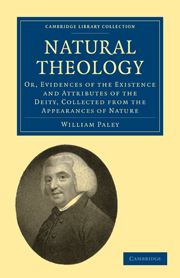 Natural Theology
Natural Theology Book contents
- Frontmatter
- Contents
- CHAP. I STATE OF THE ARGUMENT
- CHAP. II STATE OF THE ARGUMENT CONTINUED
- CHAP. III APPLICATION OF THE ARGUMENT
- CHAP. IV OF THE SUCCESSION OF PLANTS AND ANIMALS
- CHAP. V APPLICATION OF THE ARGUMENT CONTINUED
- CHAP. VI THE ARGUMENT CUMULATIVE
- CHAP. VII OF THE MECHANICAL AND IMMECHANICAL FUNCTIONS OF ANIMALS AND VEGETABLES
- CHAP. VIII OF MECHANICAL ARRANGEME'NT IN THE HUMAN FRAME—OF THE BONES
- CHAP. IX OF THE MUSCLES
- CHAP. X OF THE VESSELS OF ANIMAL BODIES
- CHAP. XI OF THE ANIMAL STRUCTURE REGARDED AS A MASS
- CHAP. XII COMPARATIVE ANATOMY
- CHAP. XIII PECULIAR ORGANIZATIONS
- CHAP. XIV PROSPECTIVE CONTRIVANCES
- CHAP. XV RELATIONS
- CHAP. XVI COMPENSATIONS
- CHAP. XVII THE RELATION OF ANIMATED BODIES TO INANIMATE NATURE
- CHAP. XVIII INSTINCTS
- CHAP. XIX OF INSECTS
- CHAP. XX OF PLANTS
- CHAP. XXI OF THE ELEMENTS
- CHAP. XXII ASTRONOMY
- CHAP. XXIII PERSONALITY OF THE DEITY
- CHAP. XXIV OF THE NATURAL ATTRIBUTES OF THE DEITY
- CHAP. XXV OF THE UNITY OF THE DEITY
- CHAP. XXVI THE GOODNESS OF THE DEITY
- CHAP. XXVII CONCLUSION
CHAP. III - APPLICATION OF THE ARGUMENT
Published online by Cambridge University Press: 07 September 2010
- Frontmatter
- Contents
- CHAP. I STATE OF THE ARGUMENT
- CHAP. II STATE OF THE ARGUMENT CONTINUED
- CHAP. III APPLICATION OF THE ARGUMENT
- CHAP. IV OF THE SUCCESSION OF PLANTS AND ANIMALS
- CHAP. V APPLICATION OF THE ARGUMENT CONTINUED
- CHAP. VI THE ARGUMENT CUMULATIVE
- CHAP. VII OF THE MECHANICAL AND IMMECHANICAL FUNCTIONS OF ANIMALS AND VEGETABLES
- CHAP. VIII OF MECHANICAL ARRANGEME'NT IN THE HUMAN FRAME—OF THE BONES
- CHAP. IX OF THE MUSCLES
- CHAP. X OF THE VESSELS OF ANIMAL BODIES
- CHAP. XI OF THE ANIMAL STRUCTURE REGARDED AS A MASS
- CHAP. XII COMPARATIVE ANATOMY
- CHAP. XIII PECULIAR ORGANIZATIONS
- CHAP. XIV PROSPECTIVE CONTRIVANCES
- CHAP. XV RELATIONS
- CHAP. XVI COMPENSATIONS
- CHAP. XVII THE RELATION OF ANIMATED BODIES TO INANIMATE NATURE
- CHAP. XVIII INSTINCTS
- CHAP. XIX OF INSECTS
- CHAP. XX OF PLANTS
- CHAP. XXI OF THE ELEMENTS
- CHAP. XXII ASTRONOMY
- CHAP. XXIII PERSONALITY OF THE DEITY
- CHAP. XXIV OF THE NATURAL ATTRIBUTES OF THE DEITY
- CHAP. XXV OF THE UNITY OF THE DEITY
- CHAP. XXVI THE GOODNESS OF THE DEITY
- CHAP. XXVII CONCLUSION
Summary
This is atheifm: for every indication of contrivance, every manifeftation of defign, which exifted in the watch, exifts in the works of nature; with the difference, on the fide of nature, of being greater and more, and that in a degree which exceeds all computation. I mean that the contrivances of nature furpafs the contrivances of art, in the complexity, fubtlety, and curiofity of the mechanifm; and ftill more, if poffible, do they go beyond them in number and variety: yet, in a multitude of cafes, are not lefs evidently mechanical, not lefs evidently contrivances, not lefs evidently accommodated to their end, or fuited to their office, than are the moft perfect productions of human ingenuity.
I know no better method of introducing fo large a fubject, than that of comparing a fingle thing with a fingle thing; an eye, for example, with a telefcope. As far as the examination of the inftrument goes, there is precifely the fame proof that the eye was made for vifion, as there is that the telefcope was made for affifting it. They are made upon the fame principles; both being adjufted to the laws by which the tranfmiffion and refraction of rays of light are regulated. I fpeak not of the origin of the laws themfelves; but fuch laws being fixed, the conftruction, in both cafes, is adapted to them.
- Type
- Chapter
- Information
- Natural TheologyOr, Evidences of the Existence and Attributes of the Deity, Collected from the Appearances of Nature, pp. 19 - 52Publisher: Cambridge University PressPrint publication year: 2009First published in: 1803


